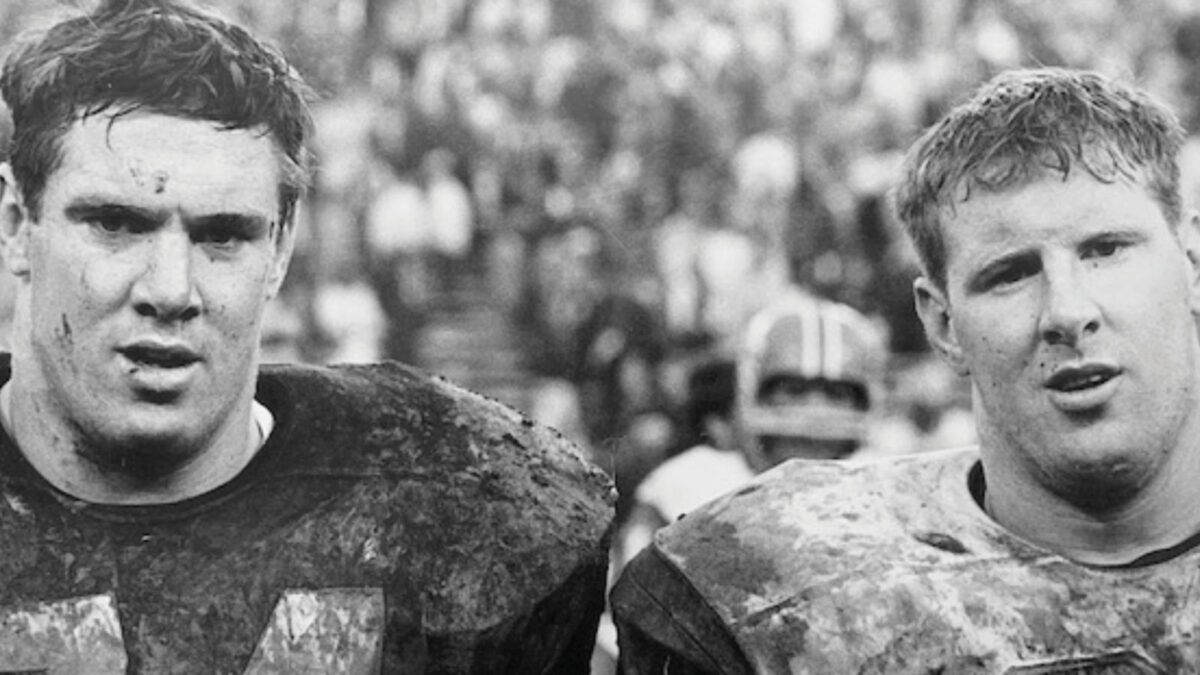
William Lawrence “Bill” Keating
Brilliant Trial Lawyer and Consummate Gentleman
December 2023
Download This Article (.pdf)
Some trial lawyers are formidable opponents. Others are gentlemen. While there are many in our profession who believe a trial lawyer cannot be both, Bill Keating proved them all wrong.
Named as “Colorado’s Best Trial Lawyer” by The Denver Post in his obituary,1 Bill Keating had the skills, drive, and intellect to surpass all others. How he became such a legend is a story in itself.
The Very Early Years
Bill was born in Chicago to James and Margaret Keating on November 22, 1944. He was their youngest son, coming after James and Tom. Bill’s father was a Chicago firefighter and fire chief; his mother was an elementary school teacher.
Bill attended and played football with St. Patrick’s High School, a Christian Brothers school that Bill credited with imbuing him with a lifelong commitment to education and social justice. The Brothers were instrumental in his admission to the University of Michigan, where he played as a guard on the 1964 Big Ten Championship and 1965 Rose Bowl Champion teams. During his senior year, Bill injured his knee, which kept him out of the full season and forced him to take the LSAT as he started thinking of life after football.
Shortly after graduating, Bill married Mary Katherine O’Brien, whom he’d known since the third grade. Bill was drafted in 1966 as a free agent by the Denver Broncos.
Neither Bill nor the Broncos stood out during his first season. However, he quickly gained a reputation as an entertainer. A press release to TV Guide mentions Bill’s football talent, but also prophetically noted: “Gifted after dinner speaker.”2
Bill’s professional football career was short-lived—the Broncos traded him to the Miami Dolphins, where he was cut that same season. He tried again with the Oakland Raiders training camp, where his brother Tom excelled, but he was released without fanfare. The coaches told him that while he had a great career ahead, it would not be in football.
Bill had already decided to make Denver home, and he pivoted to law school. But the enrollment deadline for the 1968 academic year at the University of Denver had already passed. Not one to be easily stymied, Bill walked into the dean’s office and made his case. Dean Robert Yegge bent the rules and admitted Bill, even finding some financial aid. Ultimately the University benefited from that decision, as Bill became a lifelong patron of the school.3 He graduated with his law degree in 1971.
From Gridiron to Courtroom
Being a Denver Bronco certainly had its privileges. His history with the team got him his first job in law. Bill applied to clerk with Judge Robert McWilliams on the Tenth Circuit Court of Appeals. With numerous résumés to choose from, Bill’s stood out because McWilliams was a dedicated Broncos fan.4 Bill ultimately impressed McWilliams with his legal intellect and work ethic, and they became lifelong friends.
After his clerkship ended, Bill met Bob Wagner, and the two founded what is now known as Keating Wagner Polidori Free. At the start, they took nearly all cases that came their way but eventually narrowed their focus to plaintiff’s personal injury and workers’ compensation.
In 1975, Bill and Mary welcomed their son Michael, who was a “one and only” until his sister, Katherine, or “Katie,” was born in 1980. Although no longer a professional athlete, Bill kept up his conditioning his whole life, especially enjoying cycling. He traveled the countryside throughout Europe on cycling trips with many friends, with Mike joining him frequently. He also enjoyed the solitude and peace of a solo ride, which gave his “big brain” time to think and consider new and better ways to torture his adversaries.
A Brilliant Trial Lawyer
Before long, Bill earned a reputation among lawyers as one of the very best. He had many natural talents—he was affable, outgoing, smart, and wickedly funny. If he wasn’t bettering his opponents in the courtroom or during a deposition, he was making friends with lawyers, witnesses, court reporters, staff, and anyone else who entered his orbit.
Bill was remarkably quick-witted. Early in his career, he was acting as defense counsel during a criminal trial before Judge Joseph Lilly. Judge Lilly had noticed that Bill’s client kept dozing off, but Bill was so focused on his own work that he was unaware of it. Finally, when the client fell asleep, Judge Lilly thought he had to intervene and told Bill that his client had fallen asleep. Without missing a beat, Bill simply said, “He is sleeping the sleep of the just, Your Honor.”5 The jurors loved that.
Bill was a Fellow in the International Academy of Trial Lawyers and the American College of Trial Lawyers, and he served as president of the Colorado Trial Lawyers Association in 1991. His reputation as a great trial lawyer was universal. Gregarious though he was, his natural abilities were not what made him a brilliant trial lawyer. Bill had substance.
A Legal Analyst
Many trial lawyers begin the analysis of a new case by reviewing the applicable jury instructions for relevant claims. Bill went beyond that. He had a prescience in the very early stages of a new case about how jurors or the judge would consider things during trial. It was like the trial had already occurred, and he was merely reporting what had happened.
Bill also creatively considered various evidentiary theories that would make important evidence relevant to a jury’s consideration. He was a creative thinker and relentless researcher. In one case, he had to consider ways to impute conduct from one defendant to another, when that first defendant was statutorily immune from suit. He accomplished this by leveraging a little-used theory of “civil conspiracy.”
Bill often spent evenings and weekends ensuring he understood everything about a case and the subject involved. He often took on experts head on; he would read every text, treatise, or study to prepare. He frequently undermined an expert’s opinions so thoroughly in deposition that opposing counsel had little choice but to withdraw the expert.
Bill analyzed each and every piece of evidence multiple times. He turned evidence like a Rubik’s cube to see how its significance changed and determined the most effective way to use it. I would often hear him in his “war room” (a small, interior office) clapping, foot-stomping, and giggling when he found a gold nugget.
One prime example of Bill’s approach involved a tire case he tried with W. Randolph, “Randy,” Barnhart. Almost no lawyer in the country is more qualified to handle a tire case than Randy, but even he was stunned by Bill’s ability to double-check evidence.
In their case, a woman had purchased a used truck from a large dealership in Oklahoma. The truck had been traded in by its original owner, who asked the dealership to replace the new Michelins he had put on the truck with the original tires. Ultimately, while driving on a highway in Colorado, a tire tread separated, causing the truck to cross the median and hit another car head-on.
Like all products made of rubber, tires can degrade with age, even if they do not appear to be overused. At one point, Bill inspected the tires with fresh eyes, looking inside them. What he found astounded even Randy: every tire had been patched multiple times, some on their outer rim, well known to be a dangerous practice. If the dealership had taken even a cursory look at the tires, they would have known not to sell the truck in that condition. This oversight offered the opportunity to pursue punitive damages.
A Great Storyteller
Bill could always spin a yarn. He was wonderful at telling jokes and using accents. But his ability to tell his clients’ stories was where he truly shined. Bill always listened to his clients intently. His partner Deirdre Ostrowski told me that Bill “had a real knack at finding the most effective way to describe the losses his clients experienced.”
Many trial lawyers steal the thunder from their clients and make the story their own during opening statement. Bill waited until his clients took the stand. With careful, patient, and slow questioning, he gave clients the confidence and strength to tell juries even the most gut-wrenching parts of their loss. Allowing his clients to shine was perhaps Bill’s greatest gift.
A Skilled Strategist
Strategy was the centerpiece of Bill’s talents. He considered how jurors, not just lawyers, would see evidence. He excelled at thinking like a nonlawyer. When we taught trial skills together, Bill would often say, “I think about what jurors believe a lawyer would do and then I do the exact opposite.” It takes a certain kind of lawyer to “forget” what they were taught and “remember” what everyone else sees.
Bill’s opening statements were perfection. Because he recognized that jurors do not trust lawyers at the start of a trial, his statements were short and factual. He would follow each statement with a document, photo, or other exhibit that proved what he said was true. In this way, he taught the jury that he should be trusted.
Bill had his issues. If he believed opposing counsel was being dishonest or unfair during proceedings, he lost his temper and dropped his friendly exterior in favor of a more belligerent personality. When this happened, he could lose focus. Bill worked on this imperfection his entire career, but many times his temper provided him with a laser-like focus. In the midst of his anger, Bill would find a way to devise an intricate plan that would redress the cause of his anger.
Dedication to Clients
Simply because a case had been resolved, either by settlement or trial, did not mean an end to a client’s relationship with Bill. He frequently kept in personal contact with his clients, often assisting them with various issues throughout their lives.
After a meeting with Bill to finalize their case, a client would often find an envelope enclosing both a personal note from Bill and another check as a gift. Making sure that the client always felt special was very important to Bill. He would also contact clients if he found out about new treatments or methods of assistance, including introducing them to people who might help them cope with their injuries.
Of course, Bill did not win every trial he took on. In one memorable case involving a man who had been rendered a quadriplegic in a skiing accident in foggy conditions, the jury concluded that the defendant had been negligent, but that the negligence was not a cause of the man’s injuries. Bill recalled that his client had really needed financial assistance. Even so, the client was consoling Bill after the verdict, not the other way around. Bill could not understand how the client could cope with the trial loss; Bill had gone back to his office and shut his door, not speaking to anyone. That loss truly wounded Bill, and even years later he told this story with tears in his eyes.
A Record-Setting Trial
In 2007, Bill took a case to trial involving catastrophic injuries to a young man who worked as a lineman for Xcel Energy. Qwest owned the utility pole that failed, causing the injuries. Bill teamed up with his son Mike to try the case, which resulted in a then-record high verdict for their client. They both shepherded the case through the appellate proceedings, all the way to the US Supreme Court. They ultimately prevailed.
Mike remembers the case as “one of the greatest joys of my life.” It was not just the moments in the courtroom that Mike remembers most fondly, but also “the precious moments” he and his dad shared as they shaped ideas and navigated their way through challenges. Bill was at his best when he was debating a particular thread of examination or tactic with his partners. He would argue his points but was never so conceited that he would not strongly consider other points. He was always looking to improve his work on behalf of his clients.
Bill’s Last Trial
In 2010, Bill was diagnosed with bile duct cancer. He underwent a grueling course of three rounds of chemotherapy and radiation. It was during that treatment that Bill himself argued the Qwest case successfully before the Colorado Supreme Court. Both treatment and Bill’s superb physical conditioning sent the cancer into remission. Many of us believed Bill eliminated the cancer through sheer force of will.
In late 2011, he began to feel ill again. Although Bill was an eternal optimist, he began to fear that the cancer had returned. He asked his partners to take over his remaining cases, including a wrongful death case that was scheduled to go to trial in March 2013. This case involved the death of a married father of five who died after rear-ending a street sweeper on E470. The sweeper was conducting cleaning operations at night, blocking a portion of the left lane. A difficult and complex case, Bill made certain we knew his thoughts and, more important, that we understood his strategy.
As trial approached, we waited for news from Bill. One day, he came to the office and shared that what was ailing him was not cancer and could be addressed by treatment. Bill asked sheepishly if he might take “one or two witnesses” in the upcoming trial. Needless to say, we insisted that he take over the captaincy of the case immediately!
All of Bill’s skill and talent was brought to bear in that trial. He built trust with the jurors slowly but surely and choreographed the witness presentations in his inimitable way. The case blossomed like a flower in his capable hands, and the jurors followed his every word. Although the plaintiff widow was afraid to take the stand, Bill guided her in a way that gave her confidence knowing her emotions would not be inappropriately exploited and that she could create an honest and loving picture of her husband and what his loss meant to her family.
Bill’s closing argument was dynamic—he provided the jurors with everything they needed to reach an excellent result for this family. He even gave them express permission to consider the decedent’s own negligence in making their determination. He entrusted them with the power they needed and urged them to use that power wisely.
After closing arguments, the defense made a substantial offer that I urged him to consider out of fear that our client might get nothing if we gambled. Our younger partner, Deirdre, urged Bill to reject the offer. In the end, Bill recommended that the client reject the offer because he knew the client needed a verdict from her community that told her that her husband was not the main cause of his own death. Bill’s decision paid off, and the jury returned a verdict that ensured the plaintiffs would not suffer economically from the death.
The jurors crowded around Bill after they were released from their duties. They nicknamed him “James Cromwell” after the gangly actor that Bill resembled. They applauded him for his courtesy and respectfulness. One juror told him, “You were always a perfect gentleman.”
Bill’s Death
Two years after that trial ended, Bill’s condition deteriorated again. He discovered that his radiation treatment had severely damaged his liver. Our worst nightmare came true: Bill died on January 1, 2015. As I walked into his office the day after, I found he had left a series of handwritten notes with his thoughts on several cases, not all of which had been assigned to him.
Because of his dedication to the University of Denver, they allowed his memorial to be held in the beautiful atrium at the law school. The enormous space was packed with students, faculty, staff, lawyers, friends, clients, and judges. There were too many people there to count. It was a fitting tribute to a man who made friends with everyone.
A Life Well-Lived
It is impossible to describe the hole left by Bill Keating. He had the unique ability to make us all feel that we were better than we really were—smarter, funnier, more alive. He was an extraordinary man in a world filled with ordinary people.6 A most fitting tribute came from Judge William Meyer, from the Judicial Arbiter Group, when he wrote to Bill’s son, Mike: “Your father was a consummate gentleman. Not just courteous but the George Bernard Shaw Gentleman—‘a gentleman is he who puts more into the world than he takes out.’”
In the end, it was Bill’s lifelong partner, Bob Wagner, who best articulates Bill’s impact: “There isn’t a day that goes by that my law partners and I don’t think of Bill. He inspired us, advised us, and counseled us. We have inherited the best example of a life well-lived, and he will always be our North Star.”
Notes
1. “Bill Keating Was Colorado’s Greatest Trial Lawyer,” Den. Post (Jan. 5, 2015), https://www.denverpost.com/2015/01/05/bill-keating-was-colorados-greatest-trial-lawyer.
2. 1967 Broncos Press Notes to TV Guide.
3. The University of Denver now proudly presents the William L. Keating Outstanding Alumni Award, an annual accolade that honors individuals who have left an indelible mark on their fields.
4. This, according to McWilliams’s widow, Joan.
5. This story is told by an eyewitness to these events, Bob Wagner.
6. Taken from Bob Wagner’s eulogy.


